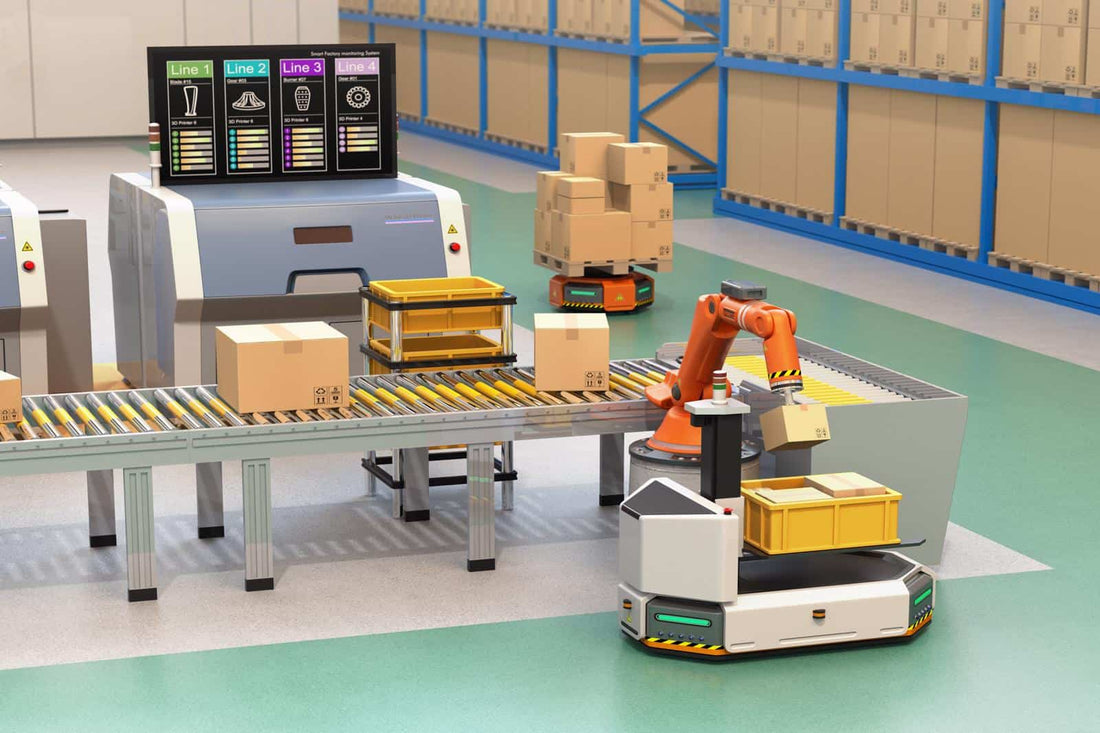
Exploring the Boom of Mobile Cobots in Manufacturing: The Future of Automation is Here
Share

The manufacturing industry is witnessing a transformative wave, with mobile collaborative robots (mobile cobots) emerging as a game-changing innovation. These intelligent, portable robots combine the capabilities of collaborative robots (cobots) and autonomous mobile robots, making them invaluable in shared workspaces. For investors, this booming market represents an opportunity to be part of the future of automation and reap significant returns.
What Are Mobile Cobots?
Mobile cobots, also known as mobile manipulators, integrate the dexterity of collaborative robots (replacing human arms) with the mobility of autonomous robots (replacing human legs). These compact robots are designed to navigate confined workspaces, transition seamlessly between tasks, and transport materials—all while working alongside humans. Their portability and versatility make them an ideal choice for modern manufacturing setups where agility and efficiency are key.
Why Mobile Cobots Are Essential in Today’s Manufacturing Landscape
Manufacturing businesses face mounting challenges, including:
1. Labor Shortages: As baby boomers retire, the skills gap widens, leaving industries struggling to find qualified workers.
2. Demanding Customers: Consumers expect better quality, quicker delivery, and lower prices—all while companies navigate a volatile global economy.
Mobile cobots address these challenges head-on by offering:
· Cost-effective automation: Requiring less investment and fewer safety restrictions than traditional industrial robots.
· Streamlined processes: Enhancing productivity and maintaining high-quality standards.
Benefits of Mobile Cobots
1. Fast and Easy Programming
Unlike traditional robots that require extensive programming expertise, mobile cobots feature user-friendly software, enabling rapid deployment. Their ability to learn new tasks quickly makes them highly adaptable to changing production needs.
2. Space Optimization
Compact and mobile, these robots are ideal for manufacturers with limited floor space. They can be stationed in one location and easily moved to other areas, maximizing operational flexibility.
3. Enhanced Safety
Mobile cobots come equipped with advanced safety features such as sensors, lasers, and cameras. These enable them to operate securely around humans and other machinery, ensuring workplace safety without compromising productivity.
4. Consistent Quality
Cobots excel in precision tasks, delivering consistent results. For instance, while tightening screws, they apply the same pressure and tension every time, ensuring uniformity and superior quality.
5. Increased Productivity
By minimizing errors and handling repetitive tasks, mobile cobots free up human workers for more complex responsibilities. This boost in efficiency leads to higher operating margins and a faster return on investment.
Future of Mobile Cobots: A Revolution in Manufacturing
The mobile cobot market is on a growth trajectory, driven by advancements in robotics and automation. Key trends include:
· AI Integration: Mobile cobots are expected to leverage artificial intelligence and advanced sensors for enhanced autonomy and functionality.
· Broader Adoption: Industries beyond manufacturing—such as healthcare, logistics, and retail—are likely to integrate mobile cobots into their operations.
· Sustainability: These robots will play a pivotal role in energy-efficient and eco-friendly production practices.
In the coming years, mobile cobots will become indispensable in manufacturing, transforming how goods are produced and driving unprecedented levels of efficiency.
Regional Market Dynamics
Asia-Pacific: Leading the Pack
With the largest market share, the Asia-Pacific region is at the forefront of mobile cobot adoption. Key drivers include:
· A rising population fueling demand for consumer goods.
· Strong adoption of automation in countries like China, Japan, and South Korea.
Europe: A Steady Climber
Europe is experiencing significant growth in mobile cobot adoption, driven by:
· High demand for automation in the automotive and food & beverage sectors.
· Government initiatives promoting robotics and automation to boost productivity and quality.
Competitive Landscape
The mobile cobots market features a diverse range of players, with companies employing strategies such as product launches, partnerships, and acquisitions to gain an edge. Leading companies include:
· Universal Robots
· Fanuc Corporation
· Yaskawa Electric Corporation
· KUKA AG
· Fetch Robotics Inc.
· Precise Automation
These innovators are driving the evolution of mobile cobots, ensuring they remain at the cutting edge of automation technology.
Why Invest in Mobile Cobots Now?
1. Expanding Market: With increasing demand across industries, the mobile cobot market is poised for exponential growth.
2. Cost Efficiency: The long-term savings and productivity gains offered by these robots make them a compelling investment.
3. Future-Proofing: Investing in mobile cobots aligns with global trends toward automation, sustainability, and digital transformation.
For investors, the boom of mobile cobots represents an unmissable opportunity to secure a stake in the future of manufacturing. By supporting this revolutionary technology, you can drive industry innovation while reaping substantial financial rewards.